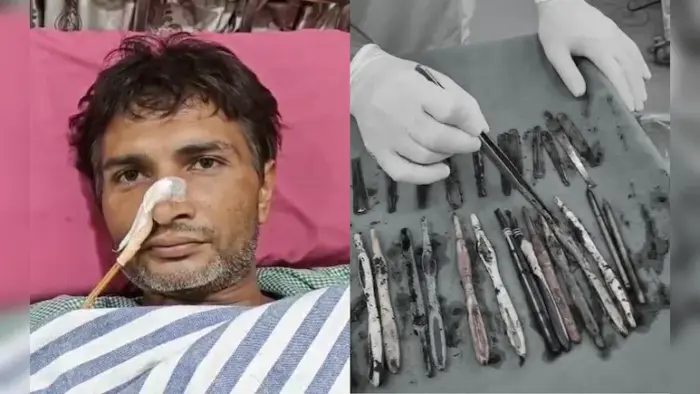In an extraordinary medical case, surgeons in Hapur, Uttar Pradesh, successfully removed 29 steel spoons, 19 toothbrushes, and 2 pens from the stomach of a man who had reportedly ingested the items over time while in a rehabilitation facility.
According to a report by the Times of India dated September 26, the man, originally from Bulandshahr—was transferred to the hospital after he began experiencing intense abdominal pain while undergoing treatment at a de-addiction centre in Ghaziabad.
Medical scans revealed an alarming presence of numerous metallic objects within his digestive tract, prompting emergency surgery led by Dr. Shyam Kumar.
“It was one of the most complex and shocking surgeries we’ve ever performed,” Dr. Kumar said. “We had to extract the items one at a time with extreme caution to avoid damaging internal organs.”
Despite the scale of the operation, the team managed to remove all foreign objects without complications. The patient has since been discharged and is reported to be in stable condition, continuing his recovery.
READ ALSO: U.S Surgeon General warns social media contributing to youth mental health crisis
In conversations with the medical team after the surgery, the man claimed he had been subjected to mistreatment and food deprivation at the de-addiction centre, which reportedly drove him to intentionally swallow the objects as a form of self-harm.
“He felt neglected and powerless,” the report noted. “Swallowing these items was his desperate attempt to express his frustration and inflict harm on himself.”
This case is not without precedent. In 2022, Hindustan Times reported a similar incident in Muzaffarnagar, where a drug-dependent man named Vijay had 63 spoons surgically removed from his stomach. He, too, had been staying in a rehabilitation facility.
In another instance dating back to 2019, doctors in Mandi, Himachal Pradesh, extracted a bizarre assortment of items—including spoons, screwdrivers, a kitchen knife, and even a door latch—from the stomach of a patient diagnosed with a severe mental illness.
Medical professionals emphasize that such extreme cases often signal underlying psychological distress or mental health disorders, particularly when linked to environments lacking adequate care and support.





